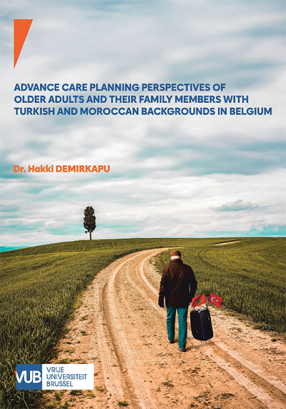Author: Hakki Demirkapu
Date: 28-06-2024
Supervisors:
Prof. Dirk Devroey, Dept. of Family Medicine and Chronic Care, Vrije Universiteit Brussel
Co-supervisors:
Prof. Lieve Van den Block, End-of-Life Care Research Group, Vrije Universiteit Brussel
Prof. Stéphanie De Maesschalck, Dept. of Family Medicine and Primary Health Care, Ghent University
Abstract
For this dissertation, older adults with Turkish background (including those requiring palliative care), older adults with Moroccan background and their family members in Belgium were interviewed to explore their familiarity with and perspectives on advance care planning (ACP). Belgium has large Turkish and Moroccan migrant populations with inadequate healthcare access and ACP engagement, as is typical for ethnic-minority groups worldwide. ACP allows individuals to outline their end-of-life care preferences in ongoing discussion with their doctors while relatively healthy. The interviewees lacked ACP knowledge and experience with doctors, but many had discussed end-of-life preferences with family members. Their perspectives on ACP ranged from acceptance to dismissal, but most considered it to be valuable and consistent with their religious beliefs, especially after receiving detailed explanations and examples. A lack of knowledge, reliance on culturally traditional family caregiving, concern about emotional burdening, a lack of urgency and (hierarchical) family dynamics were barriers to ACP. Facilitators were participants’ receipt of ACP information in their native languages, doctors’ culturally sensitive initiation of ACP discussions with the involvement of family members, adult children’s ACP knowledge to avoid worry and conflict during future decision making, older adults’ uncertainty about their children’s caregiving ability or desire to avoid burdening them, and recent family experiences of severe illness or death.
These findings could inform the culturally sensitive adaptation of ACP discussions for these migrant groups in Belgium.


